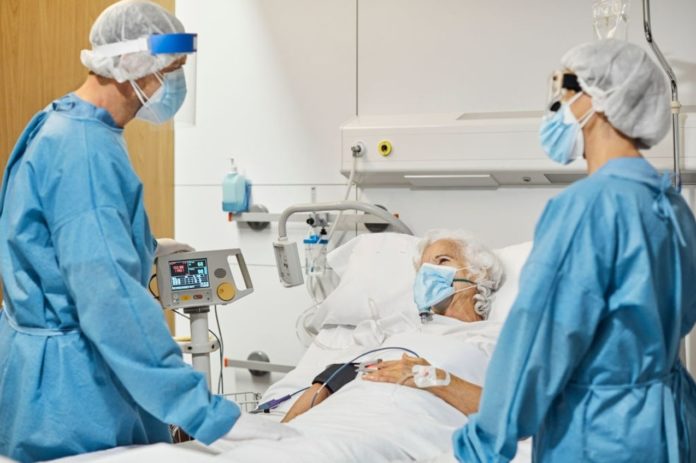A new study warns that the same genetic risk factor that raises a person’s risk of getting Alzheimer’s disease may also leave them more susceptible to severe symptoms of COVID-19.
Variants of the OAS1 gene, found by researchers at University College London, play a role in both raising dementia risk and worsening coronavirus infections.
A version of the OAS1 gene, in particular, can increase a person’s risk of suffering Alzheimer’s by three to six percent. According to the study, OAS1 mutations increase the chances of needing intensive care for COVID-19 by up to 20%. The discovery could pave the way for treatments for both illnesses.
“While Alzheimer’s is primarily characterized by harmful build-up of amyloid protein and tangles in the brain, there is also extensive inflammation in the brain that highlights the importance of the immune system in Alzheimer’s. We have found that some of the same immune system changes can occur in both Alzheimer’s disease and COVID-19,” explains lead author Dr. Dervis Salih in a university release.
“In patients with severe COVID-19 infection there can also be inflammatory changes in the brain. Here we have identified a gene that can contribute to an exaggerated immune response to increase risks of both Alzheimer’s and COVID-19.”
Immune system vs brain cells
According to the researchers, the OAS1 gene is expressed in microglia, which are immune cells that make up around 10% of all cells in the brain. During the investigation, the scientists sequenced genomic data from 2,547 participants. The most common kind of dementia, Alzheimer’s disease, affected half of these people.
According to the findings, one specific mutation in the OAS1 gene, rs1131454, causes people 11 to 22 percent more likely to acquire Alzheimer’s. According to researchers, this mutation in the anti-viral gene is quite prevalent, with more than half of Europeans carrying it.
The scientists discovered that mutations boosting Alzheimer’s risk also appear to raise the probability of suffering severe COVID-19 symptoms when evaluating four other variants of this gene, all of which reduce its activity.
What’s OAS1 working?
According to the findings, this gene regulates the amount of pro-inflammatory proteins released by the body’s immune cells. The researchers used microglia cells to simulate the effects of a COVID infection. Cells that expressed the OAS1 gene with less potency responded to the sickness in an “exaggerated response”.
This overreaction resulted in what scientists call a “cytokine storm,” in which the immune system produces an excessive amount of inflammatory chemicals in order to combat sickness. As a result, a person’s own immune system attacks healthy tissues in the body, potentially leading to life-threatening complications.
One issue with OAS1 activity is that it varies with age, which may explain why older persons are more likely to develop Alzheimer’s and COVID.
Naciye Magusali, a PhD student from the UK Dementia Research Institute at UCL, says: “Our findings suggest that some people may have increased susceptibility to both Alzheimer’s disease and severe COVID-19, irrespective of their age, as some of our immune cells appear to engage a common molecular mechanism in both diseases.”
Dr. Salih further adds: “If we could develop a simple way of testing for these genetic variants when someone tests positive for COVID-19, then it might be possible to identify who is at greater risk of needing critical care, but there is plenty more work to be done to get us there. Similarly, we hope that our research could feed into the development of a blood test to identify whether someone is at risk of developing Alzheimer’s before they show memory problems.”
The study was published in the journal Brain.
Image Credit: Getty
You were reading: Why people suffering from Alzheimer’s disease are at high risk of developing severe COVID-19?
